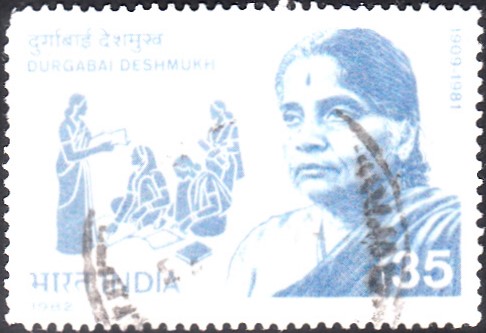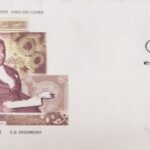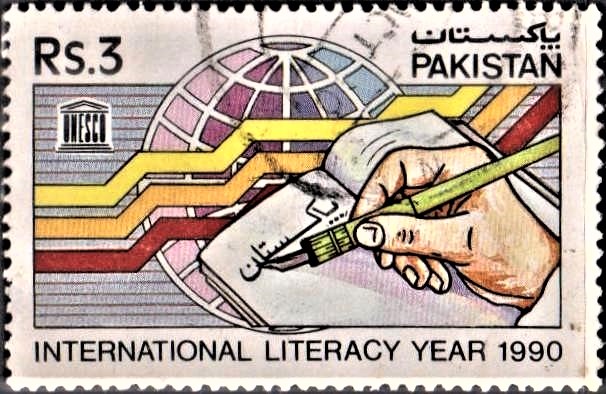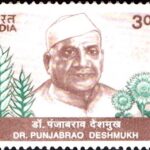
Durgabai Deshmukh
A commemorative postage stamp on the 1st Death Anniversary of Lady Deshmukh, an Indian freedom fighter and social worker, member of Constituent Assembly and Planning Commission of India, wife of C.D. Deshmukh :
 Issued by India
Issued by India
Issued on May 9, 1982
Issued for : Indian Posts & Telegraphs Department is privileged to issue a commemorative stamp in her honour.
Description of Designs : The stamp has been designed by India Security Press, Nasik. First day cover shows the Literacy House Auditorium, Hyderabad. Cancellation has been designed by Charanjit Lal.
Type : Stamp, Postal Used
Colour : Light Blue
Denomination : 35 Paise
Overall size : 4.06 x 2.75 cms.
Printing size : 3.70 x 2.40 cms.
Perforation : 14 x 14½
Paper : Unwatermarked P. G. Matt coated stamp paper
Number printed : 20,00,000
Number per issue sheet : 40
Printing process : Photogravure
Printed at : India Security Press
Name : Durgabai Deshmukh
Born on Jul 15, 1909 at Rajahmundry, Andhra Pradesh, British India
Died on May 9, 1981 at Narasannapeta, Srikakulam district, Andhra Pradesh, India
About :
- A ‘Mother of Social Work in India‘ and a “Legend among women in her lifetime“, Dr (Mrs) Durgabai Deshmukh was at once a freedom-fighter, planner, administrator, educationist, social reformer and parliamentarian.
- Born in a middle-class Andhra family, even at the tender age of 12, she came under the magic spell of Mahatma Gandhi, boycotted English-teaching school, made a bon-fire of her foreign clothings, took to charkha and joined Hindi Rashtra Bhasha Prachar Movement. She started Balika Hindi Pathshala in 1922. Moved by the plight of Devadasis and Burqa-clad women of Kakinada, she led hundreds of them to Bapuji. Her capacity to lead and an indomitable spirit to fight oppression was once again tested during the Salt Satyagraha in Madras in 1930’s, when she succeeded Shri T. Prakasham as its ‘dictator’, organised processions, was lathi-charged and thrice jailed.
- On her release in 1933, she took to her education and obtained B.A. (Hons) and M.A. (Pol. Sc.) and B.L. degrees. In 1937, she founded Andhra Mahila Sabha in Madras, which today runs two hospitals, an orthopaedic centre, two colleges, three High Schools and functional literacy projects. As President of Blind Relief Association, Delhi, she set up a school-hostel and a light engineering workshop for them. She carried her fight for the poor and weak as a Member of Parliament by getting enacted a number of social laws and mustered support for a national policy on social welfare in the Planning Commission as its Member; the result was the setting up of the Central Society Welfare Board on 13th August 1953; she became its founder Chairman and mobilised thousands of voluntary organisations and workers to carry out the programmes of the Board, aiming at education, training and rehabilitation of the needy women, children and the handicapped. Another feather in her cap is the founding of Council for Social Development at New Delhi.
- On 22nd January, 1953 she married Dr C. D. Deshmukh, the then Finance Minister, Government of India.
- She was honoured for her outstanding contribution to the cause of Peace, Social Welfare, Literacy and work among the downtrodden by national and international agencies. She won Nehru Literacy Award, Paul G. Hoffman Award, UNESCO Award for outstanding work in the field of Literacy and was decorated with PADMA VIBHUSHAN.
- (Text by courtesy : Central Society Welfare Board).








[…] from Sanskrit into Marathi, and composed verse in Sanskrit and in Marathi. After his marriage to Durgabai, he was deeply involved in the social work that she did. He received the Magsaysay award for […]